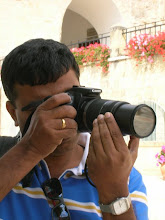peter_asirvatham@yahoo.co.in
At about 5:40 pm (local time) on 28.04.2008 my family and I along with the entourage of pilgrims crossed into Israel from Egypt. Before crossing into Israel, our last place of Biblical visit in Egypt had been The Burning Bush inside St. Katherine's Monastery and, prior to that a trek up Mt. Sinai. To visit Israel had been a dream and this came true for me on that day.
Since my return from Egypt, Israel and Jordan, I've been reliving those moments of my pilgrimage through different ways. Coming across names of places I'd visited while reading the Bible is one way. Looking at the photos I'd shot, editing the videos are other ways. Some months ago I found yet another way - Messianic Praise and Worship music.
Since my return from Egypt, Israel and Jordan, I've been reliving those moments of my pilgrimage through different ways. Coming across names of places I'd visited while reading the Bible is one way. Looking at the photos I'd shot, editing the videos are other ways. Some months ago I found yet another way - Messianic Praise and Worship music.
Messianic Praise and Worship music comes in both Hebrew and English (and I guess other languages as well). They are rendered by Messianic Jews - Jewish people or people of Jewish origin who had accepted Jesus as the "Messiah" or the "Christ". They are Christians too (they are also called Hebrew Christians or Jewish Christians) and they call Jesus as "Yeshua" - which may be the original pronunciation of the name of our Lord.
One of the songs that is repeated in the Messianic Praise and Worship albums (of my small collection) is Sh'ma Yisrael. Being the first song in two albums, it is a captivating one, even though I did not understand a word of the Jewish song. When I looked up the lyrics sheet printed on the CD cover, I saw it had a Bible reference - Deuteronomy 6: 4-6.
Googling the words "Sh'ma Yisrael" brought up a plethora of results with Wikipedia topping them. The Shema, short for Sh'ma Yisrael, is the centrepiece of the morning and evening Jewish Prayer Service and, the most important part of prayer in Judaism. Further study in the Study Bible for Deu 6: 4 points to Mark 12: 29 (and vice-versa). This is a passage that is familiar to many of us - here Jesus was questioned by a devout Jew as to which according to him is the most important commandment among the commandments. And "The most important one," answered Jesus, "is this: 'Hear, O Israel, the Lord our God, the Lord is one. Love the Lord your God with all your heart and with all your soul and with all your mind and with all your strength.' The second is this: 'Love your neighbor as yourself. There is no commandment greater than these." (Mark 12: 28-33)
In the other synoptic gospels, the evangelists Matthew and Luke have left out the "Shema" - or "Hear" (and Israel). Luke has gone beyond and expounded who a neighbour is with his Good Samaritan story. Regardless of the words "Shema" not being part of Matthew and Luke's gospels, it is an expression of our faith in one God.
The Sh'ma is recited by devout Jews while praying at The Western Wall on the Temple Mount in Jerusalem. Now, the Shema is not something unique to Jewish worship, it is part of the Christian liturgy and, is said three or four times (depending on the number of Sundays a month has) in churches that uses The Book of Common Worship.
Listening to the Shema while driving my car, on the ipod or in the church, conjures up memories of my times in Israel, especially praying at the Western Wall.
God in His Providence fulfilled my dream of visiting Israel in 2008, if it is His Will that I should go again (as I dream of going back) I'll recite the Shema at The Western Wall.
